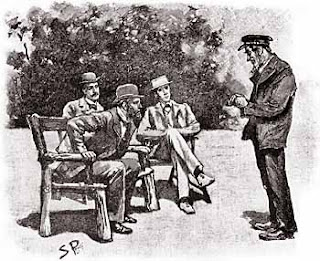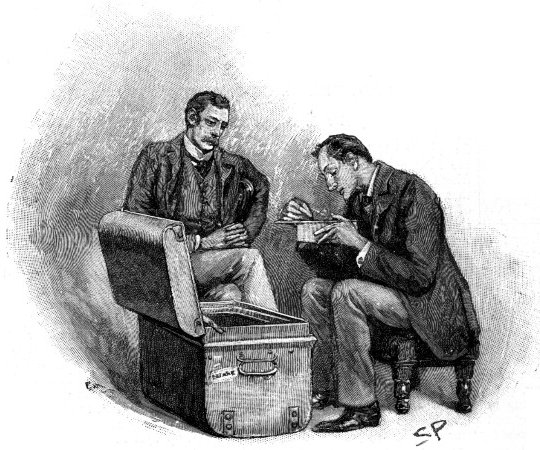The Secret Origin of Sherlock Holmes
The Sherlock Holmes stories should get a lot of praise for setting precedent. It had one of the first great fandoms - which in turn created the concept of 'canon' for a fictional universe; it prefigured the pulp action stories of the 20s and 30s (Holmes fighting, at times, the Chicago Mob, the Italian Mafia, the KKK, the German government, etc.)... and also had one of the first 'origin stories'.
In the second run of Doyle's stories, there are two that are reminisces by Holmes, told to Watson on a winter's day, of adventures that he had before they met. The first of the two, "The 'Gloria Scott'", is very much a "traditional" origin story - Holmes is in college and visits a school friend during summer vacation. He deduces secrets about his friend's father, who offhandedly suggests Sherlock do it for a living - and thus Sherlock Holmes, Consulting Detective, is born. (He doesn't really stop a crime, however; instead, his friend's father dies of fright from a blackmailer possibly exposing him, the blackmailer is murdered by another victim who then flees, and his friend is devastated to learn his father was a criminal and murderer, and moves elsewhere. Not Holmes' finest hour).
But it is the second story that intrigues me. Why does Holmes choose to tell it? Or rather, why does Watson choose this one to present of the two?
The first story was obvious - it was the story of how he decided on his path in life. The second, however, at first doesn't seem particularly significant. It's not his first case - in fact, it is said to be the third. And it definitely was not the last case he had prior to meeting Watson - there's mention of six or seven specific cases in this story alone. All we have is that Holmes felt it was a "very singular business".
The case itself, called "The Musgrave Ritual", was originally a simple mystery presented by a former classmate of Holmes, Reginald Musgrave - of an old British family. He had a peculiar problem - his father passed away two years prior, and recently he ended up firing his butler after catching him rifling through family papers in the dead of night. The butler pleads with Reginald to give him a week and then he would resign, so that he would be spared the dishonored of being sacked. Reginald agrees, but before the week is up, he vanishes - but with most of his belongings still in his room. The maid has gone mad, implying she knows something about where he went, but vanishes herself two days later, presumed a suicide; the nearby pond is dragged for her body, but only a linen bag filled with old junk is found. The only real clue is the papers that the butler was interested in - the titular "Musgrave Ritual", an old family mantra whose meaning has been lost in time.
Holmes deduces that the butler was after something to do with the ritual, and his request for an additional week a delaying tactic. He solves the riddle of the ritual, and discovers that the butler had as well - he was looking for a family treasure of some sort, with the maid, a former lover, as his assistant. When they uncover the hidden chamber, it becomes clear that the maid, a passionate person, deliberately shut him up in the chamber where he asphyxiated; she then fled.
The treasure box is empty, but Holmes quickly figures out that the objects dumped in the lake (which the butler had evidently not shared their import with his accomplice) were the treasure. Cleaned up, they are found to be coins from the time of King Charles I.... and the British crown from his time, thought destroyed, but hidden by a loyalist Musgrave who created the ritual so his descendants could find the treasure. The story then abruptly ends with the knowledge that the crown is on display at the manor (some controversy among fans exists that the family was allowed to keep it, said to be 'a considerable sum paid to retain it', but I imagine it was as stewards for property of the British crown), and the murderous, insane maid was never found. The end.
So what was significant about this particular story?
The discovery of the crown, certainly (although I'll talk about the importance of that in a moment with regards to dating the story). But Holmes talks about how before this , he only had two cases, and this was over the course of a year or so! He also mentions to Watson that by the time they met, he had 'already established a considerable, though not a very lucrative, connection' - meaning that he was busy, but also explaining why he was looking for a roommate at the time.
For one thing, Reginald Musgrave himself. It is mentioned in passing that, not only is he from an established family with its own ancient manor, but that he is a Minister of Parliament. Musgrave certainly would have connections, to both nobility (and royalty) as well as the government, two groups that often employed Holmes' services over the years.
Secondly, the discovery of the crown must have made national news. It is a sensational find, mixed with a lurid tale of poisonous love and murder. Holmes would have clearly become known to the general public as the Man Who Found the Ancient British Crown, leading to a sudden growth of his clientele, albeit those with probable low pay.
So this story is significant in that it was the case that truly established Holmes career, and allowed him to eventually have the Crown Princes and governments of Europe enlist his assistance for solving mysteries.
We could also postulate that this may have accounted for some of the scorn from police in his early career. From their perspective, Holmes failed at doing the important act with regards to the crime - catching the killer. Instead, he showboated his discovery of a treasure that had really been found by the murder victim, and not really 'solved' the case at all.
But there's one more question I have after all this....
... why on Earth doesn't Watson know about this case? The man was a sucker for reading sensationalist news stories. He surely must've read about the discovery of the British crown!
The easiest answer is that Watson did know about it, and framed it the way he did as a literary device. He does this, after all, in "The Final Problem", where he acts like he had never heard of Professor Moriarty, whereupon finding out in a later story he had known about him for a while before that adventure after all. But I think there's a more obvious answer.
Let's take it for granted that Watson did not hear about the story. While that (again) would seem unlikely, there is one particular time period that Watson would not be keeping abreast of the news for some time. Dr. Watson was in Afghanistan in 1880 and was wounded in the Battle of Maiwand on Jul 27th, 1880 - after which he was laid up recovering from the wound and then from an illness.
Since traditionally the story is dated to a July (the month in the ritual), we have the explanation; Dr. Watson was convalescing in the Middle East at the time it happened.
Therefore, he have the reason why Holmes picked this as the case to tell him about - the case that made his name as a consulting detective, yet Watson would not know about. While Holmes would play the cold calculating machine, there are enough references in the stories that he enjoyed putting on a show; and I am sure that the surprise on his friend's face when he revealed that he had a part in one of the greatest British historical discoveries in recent memory probably meant a great deal to him.


.jpg/220px-St_Edward's_Crown_-_Royal_Collection_Trust_(1).jpg)


Comments
Post a Comment